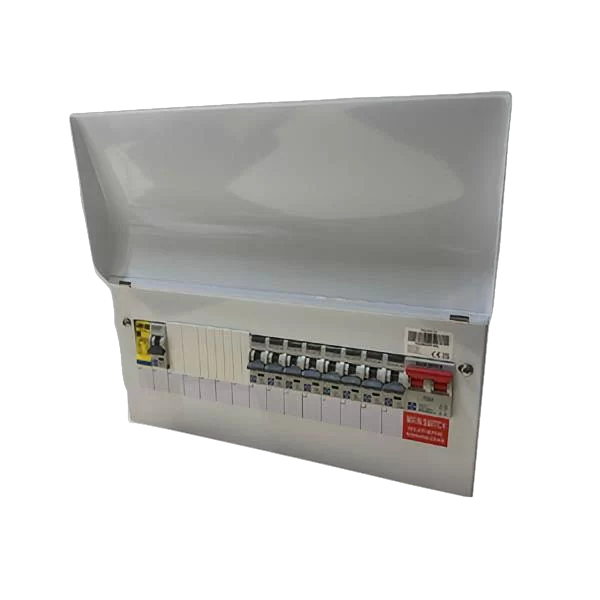A Comprehensive Overview to Keeping Your RCBO CONSUMER UNITS Efficiently
A Comprehensive Overview to Keeping Your RCBO CONSUMER UNITS Efficiently
Blog Article
The Function of Customer Devices in Efficient Power Administration Equipment
Customer devices are integral to efficient energy management systems, serving as the main circulation factors for electric power within structures. The arrival of smart technologies has further boosted their performance, enabling for real-time data monitoring and nuanced power consumption analysis.
Comprehending Consumer Systems

Recognizing the function of consumer units begins with recognizing their crucial feature in guarding electric systems. By separating mistakes within details circuits, customer units prevent extensive outages and potential fire hazards. This seclusion is attained via making use of breaker that journey or merges that strike when a fault is found, therefore removing the electrical circulation to the impacted circuit.
Additionally, consumer systems facilitate the well organized circulation of power, improving the efficiency of energy use. They permit the methodical monitoring of electric loads, which can be especially vital in commercial and business settings where need can vary substantially. Appropriately maintained customer units add to the longevity of electric systems and help in decreasing downtime brought on by electrical failures, eventually sustaining the seamless operation of energy-dependent facilities.
Smart Technologies Assimilation

An essential benefit of smart customer systems is their capacity to take advantage of progressed formulas and artificial intelligence for anticipating analytics. This allows for preemptive adjustments based upon use patterns, weather report, and various other variables, significantly increasing general effectiveness. Additionally, wise consumer systems assist in need reaction programs, where energy use can be dynamically changed throughout optimal durations to stabilize the grid and decrease expenses.
The assimilation of sustainable power resources, such as solar and wind, is additionally streamlined via clever customer devices. By wisely managing the intermittency of these sources, these units make sure a dependable and balanced power supply. Furthermore, clever customer devices enhance user involvement by supplying thorough insights and remote control capabilities with mobile applications, cultivating a much more positive method to energy preservation and sustainability.
Monitoring Energy Intake
Building on the capacities of smart innovations integration, monitoring energy usage becomes a crucial emphasis within energy monitoring systems. By leveraging innovative metering infrastructure (AMI), real-time information on power usage can be accumulated at granular levels, supplying valuable understandings right into consumption patterns and peak need durations.
Smart meters and Internet of Points (IoT) devices play a pivotal duty in this monitoring procedure. These tools can track energy usage in real-time, transferring information to centralized systems for evaluation. The gathered information is then processed with sophisticated formulas to discover abnormalities, forecast future usage, find and recommend optimization strategies. Additionally, cloud-based remedies provide scalable systems for saving and evaluating large datasets, helping with remote surveillance and control.
The assimilation of these modern technologies not only empowers customers with thorough info regarding their power usage but additionally supports energy providers in managing load distribution much more effectively. Inevitably, specific and continuous monitoring is indispensable for attaining power performance, price financial savings, and sustainability goals within power monitoring systems.
Optimizing Appliance Use

One efficient method entails recognizing height and off-peak hours to change energy-intensive tasks, such as laundry or dishwashing, to times when power demand is reduced. This not only decreases stress on the grid however likewise profits from reduced energy tolls. Furthermore, integrating artificial intelligence formulas enables predictive upkeep, guaranteeing devices operate at optimum performance and prolonging their life-span.
Power management systems can also integrate user-specific choices and habits to tailor appliance use timetables. For instance, smart illumination systems can adjust brightness based upon occupancy and all-natural light accessibility, while HVAC systems can preserve comfort levels without extreme energy usage.
Supporting Sustainability
Promoting sustainability within energy monitoring systems involves not only boosting effectiveness yet also promoting ecologically responsible methods. Customer units are integral to this procedure, as they provide real-time data and control systems that allow users to keep track of and lower their power consumption. By leveraging innovative modern technologies, consumer devices view can identify energy-saving chances and help with the combination of eco-friendly energy sources like solar Homepage and wind power.
One essential element of advertising sustainability is educating consumers on the benefits of accountable power usage. Through comprehensive insights given by customer systems, individuals can make informed decisions that reduce their carbon footprint. For example, these systems can advise optimum times for running high-energy devices based upon grid need and eco-friendly power schedule, therefore lowering dependence on fossil fuels.
In addition, customer devices support the adoption of wise grid modern technologies, which improve the general efficiency and reliability of power circulation. By allowing two-way communication in between customers and utility service providers, these systems can dynamically get used to power demands, lowering waste and advertising the usage of sustainable power methods.
Final Thought
Consumer systems, as integral parts of power monitoring systems, substantially improve electric security and performance within structures with circuit defense and clever modern technology integration. Additionally, the incorporation of renewable energy resources promotes lasting techniques, adding to minimized overall power intake and reduced carbon footprints.
Breakthroughs in wise modern technologies have reinvented the capacities of power monitoring systems, particularly via the combination of clever customer systems.Structure on the capabilities of wise modern technologies combination, keeping track of energy consumption ends up being a crucial emphasis within energy monitoring systems.Effective appliance use optimization is a crucial part of energy monitoring systems, intending to boost effectiveness and reduce unnecessary power usage.Customer units, as integral elements of energy management systems, substantially improve electric safety and security and efficiency within buildings via circuit protection and clever technology integration. In addition, the incorporation of eco-friendly power resources advertises sustainable practices, contributing to decreased overall energy usage and lower carbon footprints.
Report this page